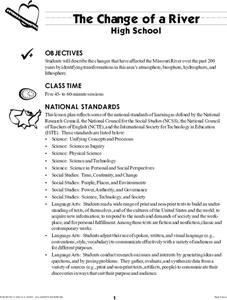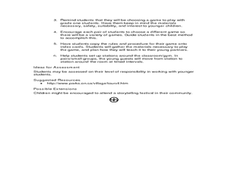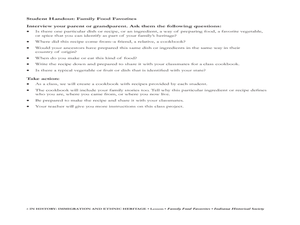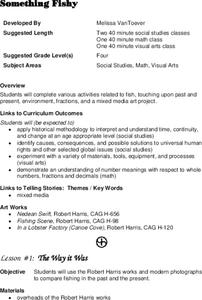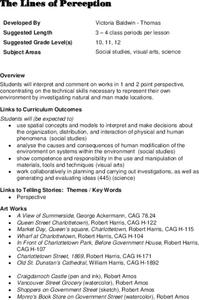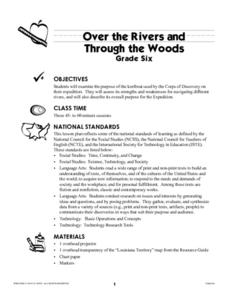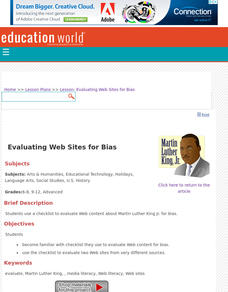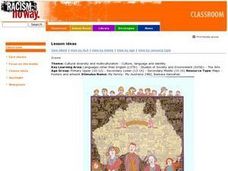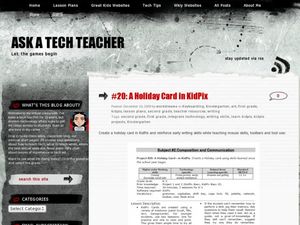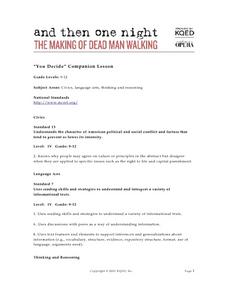Curated OER
What is Canadian?
Students explore how artworks can become symbols of national identity. They examine and analyze Song of the Nations, a site specific sculpture by Quebecois artist Armand Vaillancourt that expresses his views of Quebec's position...
Curated OER
The Change of a River
Students describe the changes that have affected the Missouri River over the past 200 years by identifying transformations in this area's atmosphere, biosphere, hydrosphere, and lithosphere. They research online in groups assigned to...
Curated OER
The Change of a River
Students explore changes in the Missouri River. For this Missouri River lesson, students discover that changes in the atmosphere cause changes in the river. Students search the Internet for information about the Missouri River and its...
Curated OER
Populists and Progressives
Learners study the Gilded Age in American History. They present a speech demonstrating knowledge of the platforms of the Progressives and Populists.
Curated OER
Children: Then & Now
Fourth graders discuss the roles and responsibilities of family members in their homes today. They decide what they do to help their families both inside and outside the home. They realize why it is important for each person to...
Curated OER
A Day in the Life
Students inquire about the politics and culture of Ancient Rome. In this Ancient Rome project/unit, students research life during ancient Roman times and create a newspaper with articles on politics, sports, culture, and economics.
Curated OER
Family Food Favorites
Third graders conduct an interview and create a class cookbook. In this family heritage lesson plan, 3rd graders read Everybody Bakes Bread and discuss a dish or recipe that is a part of their family's heritage. Students interview family...
Curated OER
Paul Conrad's Perspective on Civil Rights
Students review a political cartoon and discuss desegregation. In this cartoon analysis instructional activity, 11th graders discuss the impact of a political cartoon and its relation to a Supreme Court case. Students...
Curated OER
Something Fishy
Fourth graders study the Robert Harris works and modern photographs. They compare fishing in the past and the present. They use their knowledge of equivalent fractions to play a version of the game "Go Fish".
Curated OER
The Lines of Perception
Young scholars interpret and comment on works in 1 and 2 point perspective. They locate the focal point of works done in 1 point perspective and create a drawing of a street or landscape in their local area using 1 point perspective.
Curated OER
Victorian America: Reflections of Life in Death
High schoolers, after viewing a video and researching the changes in society during the Victorian period, assess a prediction-confirmation guide to consider how changes in burial customs in the late 1800's reflect the changes in society...
Curated OER
Canada's Constitutional Documents
Students analyze one major constitutional document and the events surrounding it. They examine primary sources (historical documents) and draw conclusions from evidence. Students write an essay and may prepare a presentation of their...
Curated OER
Rationalizing Race in US History
Students consider the classification of people. In this race studies lesson, students examine the concept of race as it relates to U.S. history and trends. Students research racial discrimination and prejudice in order to support their...
Curated OER
The Many Faces of Paul Robeson
Students discuss and construct timelines based on the life of author/performer/Civil Right's activist, Paul Robeson. They view photographs of him at various times in his life and discuss the roles he may have been playing at those times.
Curated OER
Government
Second graders run for various offices. They dress up like a politician, pretend to be running for an office, and tell the students why they should vote for him/her. They explain why it is necessary for a community to have a government
Curated OER
Over the Rivers and Through the Woods
Sixth graders examine the purpose of the keelboat used by the Corps of Discovery on the Lewis and Clark expedition. They assess its strengths and weaknesses for navigating different rivers, and describe its overall purpose for the...
Curated OER
Let Your Motto Be Resistance: African American Portraits: Grades 3-5
Students explore the contributions of African Americans of the 20th century. In this African American history instructional activity, students examine portraits of Muhammad Ali, Romare Bearden, Lorraine Hansberry, Judith Jamison, and...
Curated OER
Evaluating Web Sites for Bias
Students become familiar with checklist they use to evaluate Web content for bias. They use the checklist to evaluate two Web sites from very different sources.
Curated OER
Racism No Way
Learners explore different cultural influences and their contribution to Australian identities. They reflect on their own backgrounds and making links with their peers, reflect on our heritage. Students view My family- My Australia,...
Curated OER
A Holiday Card in KidPix
Students create a holiday card using computer software. In this computer card making lesson, students design an original holiday card using a variety of tools. Students navigate the software utilizing various tools.
Curated OER
"You Decide" Companion Lesson
Students research capital punishment and discuss different views on the death penalty. They complete a web based activity and express how certain acts of terrorism can challenge people's views on the death penalty.
Curated OER
Stop Action and Assess Alternatives
Students stop action and determine how history may have been altered. In this historical perspectives lesson, students consider how the Cherokee Removal, the Transcontinental Railroad, the Immigration Act of 1924, and the dropping of the...
Curated OER
American Made
Students view the Film American Made and view the experiences of a Sikh family in the Western part of America. In this life in America lesson, students explore the life of Americans who might by looks be thought to be...
Curated OER
Creative and Cultural Dance
Students study dance as a way to communicate and represent oneself in the world. They perform and articulate movement skills from the "dancer's toolbox". They solve problems in dance using the "dancer's toolbox" composing, witnessing,...

